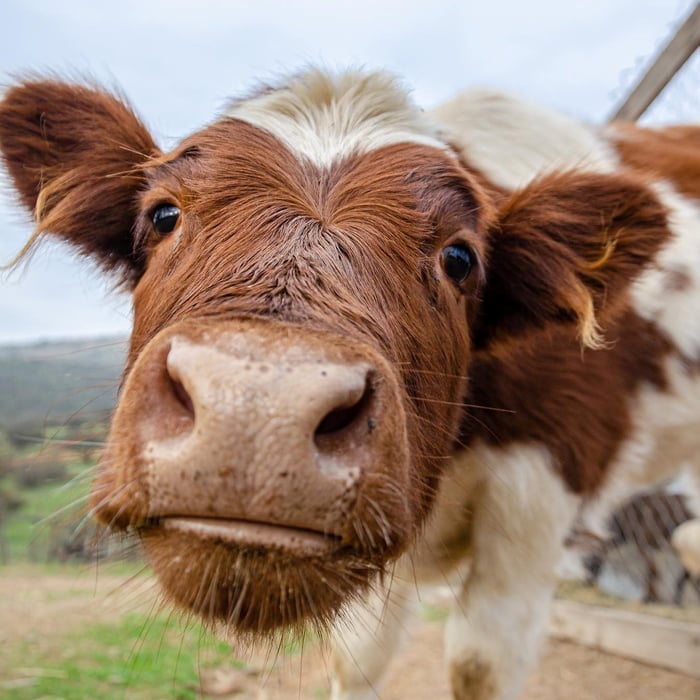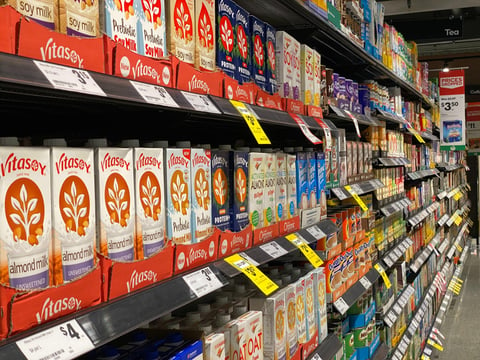As more people are turning towards a vegan or plant-based lifestyle, companies have come up with various dairy alternatives to all our favorite dairy products. In the last year alone, over 4,500 dairy alternatives were reviewed on abillionveg!
Pro-tip for vegans: When looking for dairy alternatives, you will see two labels: "Dairy-free" and "Non-dairy". Products labeled "Dairy-free" are vegan. However, the "Non-dairy" products may contain ingredients like casein, whey, and other milk-based derivatives. So, be sure to check the ingredients list on each product before making a purchase.
 Ms. Catalina Eduarda, from Santuario Clafira, is all up in your face to thank you for your interest in dairy alternatives.
Ms. Catalina Eduarda, from Santuario Clafira, is all up in your face to thank you for your interest in dairy alternatives.
Milk Substitutes
Fortunately, we now have access to various milk substitutes, also known as mylks. A popular favorite is soy milk, often described as the tastiest and most like ‘regular’ cow’s milk. Soy, coconut, and rice milk tend to be the most accessible and cost-efficient substitutes. Many other alternatives are available at supermarkets, high street coffee places, and health shops. There's a mylk for anyone's taste!
Plant-based Milks
Soy Milk
Made from whole soybeans or soy protein isolate; it has a creamy, mild taste and is the most similar nutritionally to cow’s milk.
Coconut Milk
Coconut milk is the richest and creamiest of all non-dairy products and is abundant in mono-lauric acid that is found in mother’s milk. Lauric acid heals the gut and nourishes each cell in the body.
Oat Milk
Oat milk has a sweet flavor. It's high in protein, fiber, and contains beta-glucan, which can help lower cholesterol and blood sugar levels.
Rice Milk
Rice milk is the most hypoallergenic non-dairy milk, making it a safe option for those with allergies, or intolerances to gluten, soy, or nuts. It's low in fat and protein compared to other kinds of milk and great to drink on its own as well as in smoothies, desserts, and oatmeal.
Nut-based Milks
Cashew Milk
Cashews contain heart-healthy fats like those found in olive oil. They also relax the nerves, help induce sleep, calm the body and improve your immune system.
Almond Milk
Almonds are loaded with healthy fats and are rich in vitamin E, magnesium, calcium, and potassium. Unsweetened almond milk is an excellent option if you are trying to cut down on calories.
Best-rated milk alternatives on abillionveg: Cocobeet Chocolate Mylk, Trader Joe's Nut Beverage, Good Karma Flax Milk, and Whole Foods Coconut Cream & Almond Milk
Are you team soy mylk or team oat mylk? Vote in the comment section!
Cheese Substitutes
Nutritional yeast flakes
If you're a self-proclaimed “cheese addict” but want to ditch the dairy, nutritional yeast flakes are the way to go. These dairy and gluten-free flakes offer a cheesy and nutty flavor to foods like no other dairy-free ingredient. Fortified with vitamin B, it's sprinkled on like Parmesan or used to add a delicious savory flavor to macaroni cheese sauce. They're also a fantastic source of protein, folic acid, and zinc while being low in fat and sodium.
Tofu
Sliced smoked tofu mimics mozzarella or provolone on sandwiches. For a cottage cheese or ricotta substitute, blend or mash firm silken tofu with a dash of lemon juice. This can also be used in dips, sauces, or in pasta dishes. You can find soy- and nut-based versions of cream cheese at supermarkets, or make them at home using cashews, macadamia nuts, brazil nuts, or almonds.
Best-rated cheese alternatives on abillionveg: Herb Nutmilk Cheese, Cultured Nut, Tesco Jalapeno And Chilli Cheddar, and Bleu Cheese.
Butter Substitutes
Butter is probably the most frequently used dairy product in cooking and baking recipes. Fortunately, many of the best dairy-free butter alternatives for spreading, cooking, and baking can easily be found at supermarkets or health food stores. For an all-rounded substitute, coconut oil is excellent in just about everything, from baking to stove-top cooking to spreading on toast. Healthy, creamy, and delicious, it's low in saturated fats and will not change the flavor of food too much.
Best for baking
A great butter substitute for baking is applesauce because of its sweetness, which means you will need less sugar than the recipe calls for. A mashed banana will work in place of butter and will add healthy nutrients to your dish. In many cases, you can substitute equal parts avocado for butter in recipes. This creamy fruit contains mono-saturated fat, which helps lower bad cholesterol. It works best in recipes that mask its flavor, like fudge brownies or decadent vegan chocolate cake. It also makes for a delicious replacement for butter on toast or bagels.
If you're looking to create shortcrust pastry, olive, rapeseed, and vegetable oils will do the trick. Using a harder vegan butter or vegan margarine will create the crumbly and flaky texture you're looking for in crumble toppings. Quick tip, heat is the enemy of pastry preparation, so be sure to use your butter alternatives at the coolest temperature possible.
With these substitutions, it's easy to get the same texture and moisture in baking. You might also want to consider baking without butter if you are looking to cut calories and saturated fats.
Best for Frying
When using a butter alternative for cooking, use cold-pressed olive oil for lighter frying and rapeseed oil or coconut oil for higher temperatures. Using organic reduces the amount of pesticide residue you're exposed to during cooking. Meanwhile using cold-pressed oils preserves the oil's nutritional quality. Olive and rapeseed oil are rich in omega-3 and are beneficial in skin health and hormone circulation.
Best for Spreading
sweetfarm's review of Miyoko's Cultured Vegan Butter










